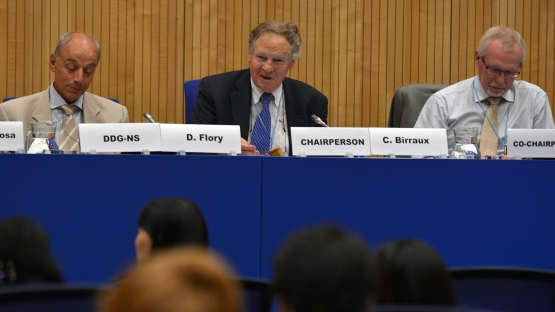A three-day experts meeting on communication in a nuclear emergency opened on 18 June 2012 at the IAEA Headquarters in Vienna, Austria.
Over 160 communication experts and government officials from 54 Member States are discussing communication challenges during a nuclear emergency. The meeting featured presentations and discussions between national governments, international organizations, Member State representatives, nuclear regulators, operators the media and other stakeholders.
Claude Birraux, First Vice President of the French Parliamentary Office for the Evaluation of Scientific and Technological Choices, chairs the Conference.
Transparent and Effective Communication
The experts addressed ways to enhance transparency and swift communication during a nuclear emergency. They identified the need for international organizations, national institutions and the media to work together and provide accessible and easily understandable information to the public.
"I want to stress that crisis communication can only work properly as part of the comprehensive management of nuclear safety, based on transparency, independence of the nuclear safety authority, repeated alert exercises, involving the general public and, overall, an impregnable will to achieving constant progress in nuclear safety," said Mr. Birraux.
The speakers described their experiences and shared their views on public communication during major emergencies such as the Fukushima Daiichi, Chernobyl, Goiânia - a major radiological incident that took place in 1987 in Brazil - and Three Mile Island accidents, as well as radiological incidents, natural catastrophes and other nuclear and public health emergencies.
Learning From Fukushima Response
In his opening address, Denis Flory, IAEA Deputy Director General for Nuclear Safety and Security, stressed the importance of learning from the nuclear accident at Fukushima. "The experience gained in response to the Fukushima accident provides valuable input for enhancing transparency and communications effectiveness at all levels: facility, local, national, regional and international," he said.
Background
This International Experts' Meeting is part of the implementation of the IAEA Action Plan on Nuclear Safety, which was endorsed by Member States at the September 2011 General Conference.
The Action Plan, consisting of 12 actions and 39 sub-actions, outlines a programme of work to strengthen global nuclear safety. Activities include enhancing and strengthening IAEA expert peer reviews, developing more robust and effective national regulatory bodies, and strengthening emergency preparedness and response. Swift and effective information dissemination is essential during a nuclear emergency.
The event takes place from 18 to 20 June at the IAEA Headquarters in Vienna.


